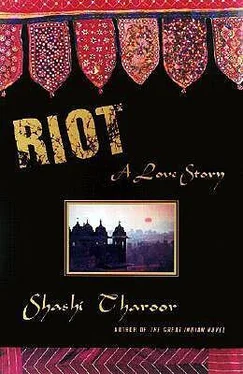And so I go along as she spins these glorious schemes in the gossamer of her illusions….
from transcript of Randy Diggs interview
with Professor Mohammed Sarwar
October 12, 1989
You should know what Maulana Azad said when he became president of the Indian National Congress at Ramgarh in 1940. I’d give you a copy of the speech, Mr. Diggs, but I don’t have access to a photocopier in Zalilgarh. It doesn’t matter; I know the words by heart. There is no greater testament of the faith of a religious Muslim in a united India.
The Maulana was a religious scholar, born in Mecca, educated in the Koran and the Hadith, fluent in Persian, Arabic, and Urdu, an exemplar of Muslim learning and culture in India. Yet he confessed that “every fiber of my being revolted” against the thought of dividing India on communal lines. “I could not conceive it possible for a Musulman to tolerate this,” he declared, “unless he has rooted out the spirit of Islam from every corner of his being.” Remember that his principal rival for the allegiance of India’s Muslims was Mohammed Ali Jinnah, the leader of the Muslim League, an Oxbridge-educated Lincoln’s Inn lawyer who wore Savile Row suits, enjoyed his Scotch and cigars, ate pork, barely spoke Urdu, and married a non-Muslim. There was no question in the Maulana’s mind as to who was the better Muslim; yet Jinnah claimed to speak for India’s Muslims and to assert their claims to being a separate nation, while the Maulana worked in the secular (Jinnah said Hindu-dominated) Indian National Congress to remind his fellow Muslims where their homeland really was.
“I am a Musulman and proud of the fact,” he said in that great speech. Shall I go on? Is your tape recorder working? “Islam’s splendid traditions of thirteen hundred years are my inheritance. I am unwilling to lose even the smallest part of this inheritance. In addition, I am proud of being an Indian. I am part of that indivisible unity that is Indian nationality.” And then he added — this is the key part — “I am indispensable to this noble edifice. Without me this splendid structure of India is incomplete. I am an essential element which has gone to build India. I can never surrender this claim. It was India’s historic destiny that many human races and cultures and religions should flow to her, and that many a caravan should rest here…. One of the last of these caravans was that of the followers of Islam. They came here and settled for good. We brought our treasures with us, and India too was full of the riches of her own precious heritage. We gave her what she needed most, the most precious of gifts from Islam’s treasury, the message of human equality. Full eleven centuries have passed by since then. Islam has now as great a claim on the soil of India as Hinduism.”
It took courage to say this. The Maulana was dismissed by Jinnah as a “Muslim showboy,” a token elected by the Congress to advertise its secular credentials. But the Maulana was not immersing his Islam in any woolly notion of Indian secularism, still less was he uncritically swallowing Hindu professions of tolerance and inclusiveness. He was, instead, asserting his pride in his religious identity, in the majesty and richness of Islam, while laying claim to India for India’s Muslims. He dismissed talk of partition by arguing that he was entitled — just as any Hindu was — to a stake in all of India, from Kashmir to Kanyakumari, from the Khyber Pass to Khulna; why should he accept the Pakistani idea of a narrower notion of Muslim nationhood that confined Indian Muslims to a truncated share of the heritage of their entire land? He was a far more authentic representative of Indian Islam than Jinnah, and it is part of the great tragedy of this country’s Muslims that it was Jinnah who triumphed and not Azad.
Triumph? Partition was less a triumph for Indian Muslims than an abdication. In fact, most of the country’s Islamic leaders, and especially those whom you might think of today as “fundamentalists” (people like Maulana Maudoodi, who was to spend years in Pakistani jails), were bitterly opposed to the movement for Pakistan. They felt that Islam should prevail over the world at large and certainly over India as a whole, and they thought it treasonous — both to India and to Islam itself — to advocate that the religion be territorially circumscribed as Jinnah and the Muslim Leaguers did. Pakistan was created by “bad” Muslims, secular Muslims, not by the “good” Muslims in whose name Pakistan now claims to speak.
You can understand why some Indian Muslims are more viscerally anti-Pakistan than many Hindus, especially North Indian Hindus with their romanticized nostalgia for the good old days before Partition. Indian Muslims know what they have lost, what burdens they have to bear as the result of the Jinnah defection, the conversion of brothers into foreigners. Mohammed Currim Chagla, who was India’s foreign minister during the 1965 war with Pakistan, made a speech in Parliament during the Bangladesh war of 1971 in which he said that “Pakistan was conceived in sin and is dying in violence.” Do you know M. J. Akbar, the editor of the Telegraph? India’s brightest young journalist, a real media star, and a Muslim. Well, he famously denounced Jinnah as having “sold the birthright of the Indian Muslims for a bowl of soup.” Some of us feel that our birthright cannot be so easily sold, but it is precisely that sense of loss that drives so many of us to rage and sorrow — the feeling that, since the country was divided in our name, we are somehow less entitled to our due in what remains of it. That a part of our birthright has indeed been given away.
Which leads some of my fellow Muslims into a sort of self-inflicted second-class citizenship, a result of our guilt by association with the original sin of Partition. “If you don’t like it here in India,” say the crassest of the Hindu bigots, “why don’t you go to Pakistan?” How can you reply, “Because this is my home, I am as entitled to it as you are,” when Jinnah and his followers have given the Hindu bigots their best excuse? When they acted, in the name of all Indian Muslims, to surrender a portion of our entitlement by saying that the homeland of an Indian Muslim is really a foreign country called Pakistan?
These are the feelings that are played upon by the Hindu chauvinists. They build their case on our own concession of failure. And I’m not talking about the extremist crackpots who claim the Taj Mahal was really a Hindu palace, but the seemingly reasonable ones who call on Muslims to “assimilate” properly, to “acknowledge” our Hindu origins and subordinate ourselves to their notion of the Indian ethos. There are always some Muslims who’ll submit to this nonsense, who’ll accept a notion of the Indian ethos that doesn’t include them. But for every Indian Muslim who’s vulnerable to such feelings of guilt, there are two who have outgrown it — who assert, like the Maulana, that India is not complete without us, that we are no less Indian than the most chauvinist Hindu.
But who owns India’s history? Are there my history and his, and his history about my history? This is, in many ways, what this whole Ram Janmabhoomi agitation is about — about the reclaiming of history by those who feel that they were, at one point, written out of the script. But can they write a new history without doing violence to the inheritors of the old?
Once, when I was in college, a fellow got into an argument with me and lost his temper. “You partitioned the country!” he yelled. I interrupted him. “If I’d partitioned the country, I wouldn’t be here. I’d be in Pakistan,” I said. “If you mean I’m a Muslim, I plead guilty to the charge of being Muslim. But to no other charge. Muslims didn’t partition the country — the British did, the Muslim League did, the Congress Party did. There are more Muslims in India today than in Pakistan. This is where we belong.” I said it quietly, but the fight died in him then. He spluttered and walked away. I stood my ground. All Indian Muslims must, or they will soon have no ground to stand on.
Читать дальше












